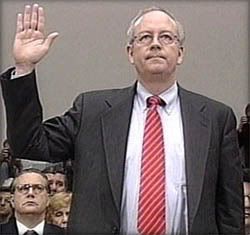The Bill of Rights Is The First Casualty Of The War On Drugs
What do you mean we can’t punish oral sex just because it happens off-campus? Let’s install cameras! It will destroy our precious bodily fluids educational mission!
The War On (Some Classes of People Who Use Some) Drugs has, among its many other problems, acted as an all-purpose Fourth Amendment destruction machine. The nation’s former Panty-Sniffer-in Chief proposes that we throw the First Amendment into the refuse heap while we’re at it:
Oral argument in Morse v. Frederick does reveal some of the worst aspects of sharing a bong. The first being paranoia. Because according to Kenneth Starr, former righteous independent counsel—now tanned Californian law-school dean—the fate of the drug wars depends upon the unconditional school message that drugs are bad, yet schools cannot enforce that message because smartass kids keep undermining them. Starr’s alternative (and if you ask me, far more paranoia-inducing) universe: Schools get limitless discretion to craft broad “educational missions” and are then free to squelch any student speech that “undermines” them.
The justices appear to loathe each alternative about equally. At some point, Justice Stephen Breyer groans that a ruling for the students would encourage them to be “testing limits all over the place in the high schools,” whereas a ruling for the schools would certainly end up limiting lots of speech.
Starr opens with the statement that “the glorification of the drug culture” is at stake here. He claims that schools, even under the broad standard laid out in the armband case, can’t necessarily limit political protest but may bar “disruptive speech.” This sets the court’s hippies off. Justice Anthony Kennedy: “There’s no classroom here.” Justice David Souter: “What did it disrupt on the sidewalk?”
Yes, it’s certainly not as if these restrictions are content-based restrictions of speech!
That middle paragraph is a little scary; I fear that we might be in for a Breyer swing opinion in which he upholds the policy but writes a “compromise” opinion emphasizing that a future violation of the First Amendment might be enough to shock his conscience or something.



